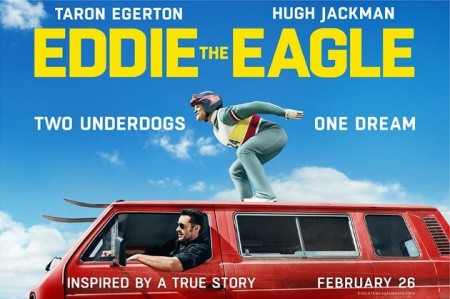'Eddie the Eagle' an Inspiring True Story With Lessons for Parents and Kids

Americans love the underdog, perhaps because our own country was founded by a group of colonists that, at the time, faced long odds in their battle against the British.
We cheer for the lower seeds during March Madness, the dark horse at the Kentucky Derby, and the long shot at the Super Bowl.
I thought about that as I watched "Eddie the Eagle," which opens this weekend and tells the true story of the 1980s British downhill skier named Eddie Edwards, who switched to ski jumping to give him a better chance of fulfilling his lifelong goal of making the Olympics. Quirky, a bit nerdy and incredibly determined, Edwards overcame every obstacle — including a lack of skill, money and training — to qualify for the 1988 Winter Olympics in Calgary, where he became a media sensation as the first-ever member of the British Olympic ski jumping team and, despite finishing dead last in both of his events, became symbolic of the Olympic spirit.
He may have been British, but his underdog story might as well have been American.
The film opens by giving us a glimpse of his childhood, as we watch a young, clumsy Edwards — with bad eyesight and extra-thick glasses — trying to find a sport in which he can excel.
"Eddie, you are not an athlete!" his father tells him.
The doctors agree, and urge him to spend more time reading.
But Eddie marches on, refusing to listen to the naysayers.
When he fails as a young adult to qualify for the British Olympic team as a downhill skier, he learns that the British ski jumping roster is empty. In other words, if he can just learn to land a jump, he can make the team. Others, though, aren't amused.
"You do realize that the time to start jumping is when you are 5 or 6," he is told.
Ski jumping is one of the more dangerous Olympic sports. The athlete skis down an "in-run" at roughly 60 mph before taking off like a bird. But if he doesn't "land" the jump, he tumbles down the hill like a ragdoll in a tornado, often breaking bones along the way — if not worse.
When Eddie (played stellarly by Taron Egerton) asks his coach for advice on one of his first jumps, the latter responds, "Don't die."
In the film, seemingly everyone opposes Eddie: his family, his teammates, and even officials with the British Olympic Association.
When he finally makes the Olympics — and sets a British ski jumping record in the process — the shunning continues. His teammates get the normally teetotaling Edwards drunk, and then put him in a laundry basket for the night. Later, after he competes, British officials intentionally leave his name off a list of British athletes allowed to eat at an all-inclusive lunch. Dejected, he turns around and leaves.
By the end of the movie, we're all cheering for Eddie to prove everyone wrong, which he does.
There's a lot to like about "Eddie the Eagle," especially for parents of teens and children, who may know someone who has been labeled a "geek." The film does a nice job of making the bullies look like, well, jerks, and the supposed "nerd" (Eddie) out to be the hero. No one deserves to be treated the way Eddie was, simply because each person bears the Imago Dei ("image of God."). And as I tell my kids often: Treat others the way you want to be treated (Luke 6:31).
There's also a lesson in the film for parents. Although Eddie's father does come around in the end, he's a vocal obstacle for much of the movie — and it's painful to watch. I walked out wanting to encourage my children even more, no matter if they fail.
"Eddie the Eagle" does deviate from the true-life story quite a bit (his coach is a fictitious character), but it is nevertheless funny and inspiring, and among the most entertaining sports movies I've watched. It's also mostly family-friendly, especially for teens and maybe older children (details below).
Entertainment rating: 3.5 stars out of 5. Family-friendly rating: 3.5 out of 5.
Eddie the Eagle is rated PG-13 for some suggestive material, partial nudity and smoking. It contains about four instances of coarse language (three h--- and one a--), and a few misuses of "God." There is a sauna scene involving men where private areas are strategically covered. There's also a scene where Eddie's coach, while teaching him to jump, jokingly makes sexual sounds.
Post-movie discussion topics: bullying — do we know children like Eddie?; supporting our kids — did Eddie's father go too far?; setting goals — at what point do we hit the "re-set" button and set goals for something else?
This first appeared at ChristianExaminer.com.





















